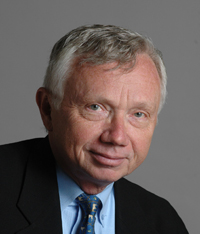 |
Richard Jackson, M.D. |
During the lecture, which will be held at 7 p.m. on April 11 in the Durham Research Center, Richard Jackson, M.D., will show how the shaping of society’s built environments contributes to people’s well being and future.
As concerns grow about global warming, obesity and the way Americans use natural resources, Dr. Jackson will show how shaping our physical environment can help society become healthier.
Dr. Jackson’s lecture, titled “Why good design is better than an apple a day,” is sponsored by UNMC and the Nebraska chapter of the American Institute of Architects (AIA) in celebration of the AIA’s 150th anniversary. All employees and students are invited to attend. Refreshments will be served.
Before the lecture, Dr. Jackson will sign copies of the book, “Urban Sprawl and Public Health,” which he co-authored with Howard Frumkin and Lawrence Frank.
Dr. Jackson has held many leadership positions with the California Health Department, including state health officer. He helped establish the California Birth Defects Monitoring Program as well as state and national laws eliminating several dangerous pesticides.
He also was director of the Centers for Disease Control and Prevention’s (CDC’s) National Center for Environmental Health for nine years. While there, he established a national asthma epidemiology and control program and managed a childhood lead poisoning prevention program. He also initiated the federal effort to “biomonitor” chemical levels among the country’s population.
In the late 1990s, he led the CDC in establishing the U.S. National Pharmaceutical Stockpile, a disaster preparedness measure that was put to use following the attacks on New York and Washington on Sept. 11, 2001.
In 2005, he received the Presidential Distinguished Executive Award, the highest civilian award for U.S. government service.
Jackson has been on many medical and health boards and in 2005 he was selected to serve on the AIA’s Board of Directors.